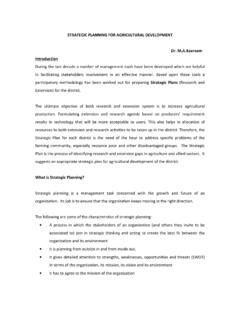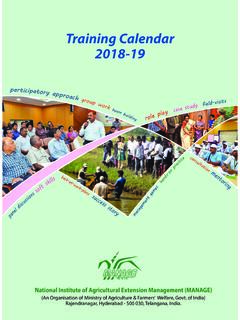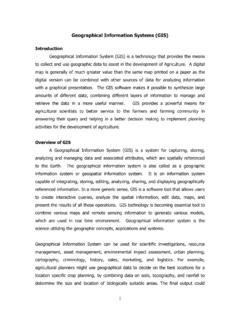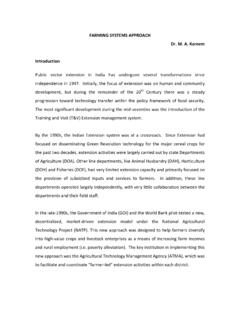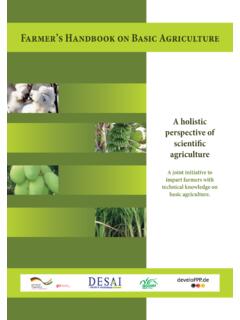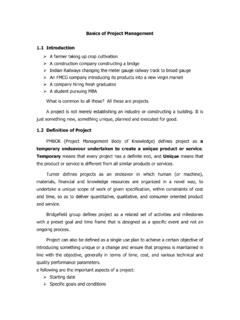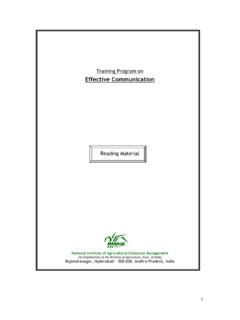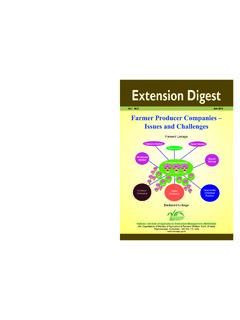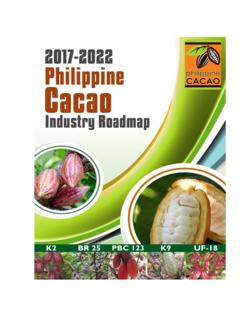Transcription of Climate Smart Agriculture - MANAGE
1 Extension and Advisory Services for Climate Smart Agriculture Bulletin No. 3, 2018 Published byNational Institute of Agricultural Extension Management ( MANAGE )(An Organization of Ministry of Agriculture and Farmers Welfare, Govt. of India) MANAGE -Centre for Agricultural Extension Innovations, Reforms and Agripreneurship (CAEIRA) Rajendranagar, Hyderabad 500 030, Telangana State, India MANAGE , 2018 About the PublicationThis bulletin series is aimed at imparting better understanding about recent developments in agricultural extension. It also intends to develop basic understanding about the role of extension in agricultural and allied sectors and start a dialogue on how to make extension efforts to contribute for better impact. Each issue of the bulletin will take up a single topic and discuss merits and implications.
2 The target audience for the bulletin are extensionists, extension managers and administrators, extension students, policy makers, and agricultural practitioners. AuthorsDr. Saravanan RajDirector (Agricultural Extension) National Institute of Agricultural Extension Management ( MANAGE ) Rajendranagar, Hyderabad, Telangana, India e-mail: Dr. Sankri Karthikeyan MANAGE Fellow, Centre for Agricultural Extension Innovations, Reforms, and AgripreneurshipNational Institute of Agricultural Extension Management ( MANAGE ) Rajendranagar, Hyderabad, Telangana, India e-mail: Vincent AMANAGE Intern, Centre for Agricultural Extension Innovations, Reforms, and AgripreneurshipNational Institute of Agricultural Extension Management ( MANAGE ) Rajendranagar, Hyderabad, Telangana, India e-mail: DesignMs. Niharika LenkaDisclaimerThe views expressed in the document are not necessarily those of MANAGE but are of the authors own.
3 MANAGE encourages the use, reproduction and dissemination of this publication for personal study and non-commercial purposes only with proper acknowledgement of MANAGE as the source and copyright holder. Correct citation: Saravanan, R. Karthikeyan, S. and Vincent, A. 2018. Extension and Advisory Services for Climate Smart Agriculture . MANAGE Bulletin 3 (2018), National Institute of Agricultural Extension Management ( MANAGE ), Hyderabad, NEXT is a bulletin published by MANAGE to highlight the concepts which extension personnel today need to focus are the days where seasons are well defined, rainfall is expected as per the schedule. In the present scenario, all the weather parameters including temperature, rainfall are varying with unpredictable patterns resulting in flash food, drought and raise in sea-level etc.
4 , This drastic changes in Climate are affecting Agriculture and thus livelihood security of Indian farmers. Though, there should be a long term policy to combat situation handling the causative factors affecting Climate like deforestation, industrialization, Vehicular pollution, but there is an immediate need enabling the farmers to face the situation by duly modifying present Agriculture into Climate Smart Agriculture . This involves selection of appropriate crops, appropriate varieties, and agrarian practices including integrated farming systems. In order to facilitate farmers to take appropriate decision, extension advisory services need to update farmers on minute expected changes in Climate and its implication, weather forecast, so that farmer can plan field operators bulletin definitely will sensitize policymakers, extension personnel and farmers about challenges in Agriculture due to Climate change and need to gear upto the situation otherwise the future of farmers and all those dependents on Agriculture will be bulletin reviews briefly about Farmer Advisory Services existing in many countries and narrates how information is quickly transferred Smt.
5 V. Usha Rani, IASD irector General, MANAGEM essage from Director General, MANAGEto farmer by the extension functionaries. There is also a need for researchers to focus on Climate Smart Agriculture and develop relevant technologies to face new challenges being posed by ever degrading hope this bulletin is handy in providing good information about Climate Smart Agriculture and skills required for extension officials, the administrators and policymakers to handle the situation effectively and also a need for placing appropriate system in suggestion in this regard are most welcome. (V. Usha Rani)Extension and Advisory Services for Climate Smart Agriculture Bulletin No.
6 3, 2018In this issueAbbreviations and AcronymsIntroductionClimate change, perception of different stakeholders, and impact of Climate change: Mitigation and adaptation to Climate changeWhat is Climate Smart Agriculture ?Why Climate Smart Agriculture ? Climate Smart Villages and servicesKnowledge Management in CSAICTs in CSAP olicy support to Climate Smart AgricultureImplications for Agricultural ExtensionReferencesi121718202934444446 Abbreviations and AcronymsAFOLU Agriculture , Forestry and Other Land UseAR4D Agricultural Research for DevelopmentCCAFS Climate Change Agriculture and Food SecurityCGIAR - Consultative Group for International Agricultural ResearchCICSS - Cornell Institute for Climate Smart Solutions CLAP - Local Early Warning Committees CMP - Comprehensive Management PlanCOP Conference of PartiesCSA Climate Smart Agriculture CSV - Climate Smart Village EPIC Economics and Policy Innovations for Climate Smart AgricultureFAO Food and Agriculture OrganisationFAOSTAT - Food and Agriculture StatisticsGACSA Global Alliance for Climate Smart AgricultureGHG Green House GasGLAM - Groups for Local Meteorological Assistance GCAM - Municipal Rural Meteorological Assistance Groups and ICAR Indian Council of Agricultural ResearchICRISAT - International Crops
7 Research Institute for the Semi-Arid TropicsICT Information and Communication Technology INDC Intended Nationally Determined ContributionsIPCC - Intergovernmental Panel on Climate Change LI-BIRD Local Initiatives for Biodiversity, Research and DevelopmentMICCA Mitigation of Climate Change in AgricultureNAMA Nationally Appropriate Mitigation ActionsNAP National Adaptation PlanNGO Non-Governmental OrganisationNICRA - National Innovations on Climate Resilient AgriculturePICSA Participatory Integrated Climate Services for AgricultureRABIT Resilience Assessment Benchmarking and Impact ToolkitUNFCCC United Nations Framework Convention on Climate Change USAID United States Agency for International DevelopmentUSDA United States Department of AgricultureiExtension Next: Bulletin No. 3, 20181 Extension Next: Bulletin No.
8 3, 2018 IntroductionAgriculture is the most vulnerable and sensitive sector affected by Climate change because of its dependency on local Climate parameters like rainfall, temperature, soil health etc. Impact of Climate change on Agriculture will be one of the major deciding factors influencing the future food security of mankind on the earth. The estimated impacts of both historical and future Climate change on cereal crop yields in different regions indicate that the yield loss can be up to 35% for rice, 20% for wheat, 50% for sorghum, 13% for barley, and 60% for maize depending on the location, future Climate scenarios and projected year (Porter et al., 2014). In Asia, agricultural crop yield are expected to decline by 5-30% by 2050s due to rising temperature in Himalayas and this decline in agricultural yield will lead to food insecurity, which becomes a serious future problem for human beings.
9 Higher temperature eventually reduces yields of desirable crops while encouraging weed and pest proliferation (IPCC, 2007). Increasing the productivity and incomes from smallholder crop, livestock, fisheries and forestry production systems will be key to achieving global food security (FAO and CGIAR, ). Understanding the weather changes over a period of time and adjusting the management practices towards achieving better harvest are challenges to the growth of agricultural sector as a alleviate the challenges posed by Climate change, Agriculture has to become Climate Smart . The concept of Climate Smart Agriculture (CSA) was originally developed by FAO and officially presented and at the Hague Conference on Agriculture , Food Security and Climate Change in 2010, through the paper Climate Smart Agriculture : Policies, Practices and Financing for Food Security, Adaptation and Mitigation.
10 Climate Smart Agriculture (CSA) is an approach that helps to guide actions needed to transform and reorient agricultural systems to effectively support development and ensure food security in a changing Climate (FAO, 2010).Despite the recognised importance of Climate Smart Agriculture (CSA), the dissemination and uptake of Climate - Smart technologies, tools and practices is still largely an ongoing and challenging process. The adaption of Climate -related knowledge, technologies and practices to local conditions, promoting joint learning by farmers, researchers, extension personnel and widely disseminating Climate Smart Agriculture (CSA) practices, is critical. CSA approach deals with these interlinked challenges in a holistic and effective manner (Sala et al., 2016).
